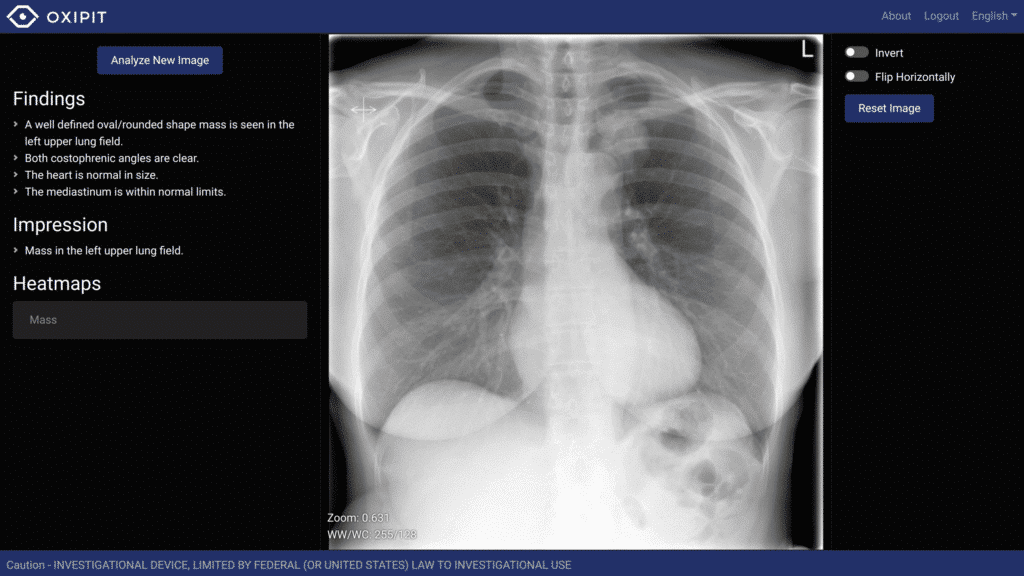CODE_n Alumnus Oxipit gains certification for its AI ChestEye imaging suite
 There’s no doubt that artificial intelligence has the potential to change all sectors and it’s becoming more and more prevalent in our healthcare systems. We’re thrilled to report that our CODE_n Alumnus Oxipit, a leading AI-based medical imaging solutions provider, has recently received the CE mark for its ChestEye radiology imaging suite. Headquartered in Lithuania, the team is now one step closer in helping radiologists harness the capabilities of deep learning in order to increase productivity and add value for patients by providing more accurate diagnosis. In this interview, Jogundas Armaitis, COO of Oxipit, is telling us more about their plans for the near future and how they are going to equip radiologists to reach their goals faster.
There’s no doubt that artificial intelligence has the potential to change all sectors and it’s becoming more and more prevalent in our healthcare systems. We’re thrilled to report that our CODE_n Alumnus Oxipit, a leading AI-based medical imaging solutions provider, has recently received the CE mark for its ChestEye radiology imaging suite. Headquartered in Lithuania, the team is now one step closer in helping radiologists harness the capabilities of deep learning in order to increase productivity and add value for patients by providing more accurate diagnosis. In this interview, Jogundas Armaitis, COO of Oxipit, is telling us more about their plans for the near future and how they are going to equip radiologists to reach their goals faster.
Iulia: Hi Jogundas! We are thrilled to know that Oxipit reached one of the most anticipated milestones. Your AI-based tool for chest X-ray analysis has recently secured CE mark. Tell us how this will impact the distribution of your solution across the EU market.
Jogundas: Hi, Iulia! We are very proud of this achievement! The medical device certification is a huge milestone for our company founded in 2017. The ChestEye software suite is now officially considered a medical device, and it can be used in a clinical setting throughout Europe. This means that our product has just become available to radiologists in 32 countries.
Iulia: How will the ChestEye suite contribute to diagnostic precision and radiologists’ productivity?
Jogundas: I would like to emphasize from the outset that we are helping the radiologists, not replacing them. The suite has three modules, each of them assisting the radiology workflow in a different way. The computer-aided diagnosis (CAD) module localizes 75 radiological findings on a chest X-ray image and uses this information to generate a text report, just like a human radiologist. An internal trial has shown that using this module for preliminary report generation can increase productivity of a radiologist by more than 40% and also reduce the error rate by up to 50%.
The Search module is a search engine for finding similar-looking chest X-rays in a given database empowering the user to quickly find retrospective cases with similar radiological appearance. This is very helpful for radiologists in training, or when rare findings are encountered. The suite also includes a patient prioritization solution, which invites specialist attention to potentially unhealthy patients first.
 Iulia: Are you already in touch with hospitals, clinics or universities that are interested in trying your product right away?
Iulia: Are you already in touch with hospitals, clinics or universities that are interested in trying your product right away?
Jogundas: It’s is safe to say that the number of radiologists who have tried out our solution is well over 100, and their feedback has been extremely valuable to us. We are also continuing to work with academic partners (including several university clinics in Germany) for strong independent validation of the product.
At the same time, we have signed up the first large paying clinic, and we are in talks with several more. This milestone is also crucial, since it means that the demand and the willingness to pay is there – which is not an often-encountered beast in the land of startups. That being said, we are very actively looking for more early adopters, be it clinics, hospitals, universities or individual radiologists interested in trying out our solution.
Iulia: What other upcoming plans do you have for the near future?
Jogundas: The European Congress of Radiology is coming up at the end of February in Vienna, and we are looking forward to presenting our CE-approved product there. It is interesting to note that a large part of the event is dedicated to artificial intelligence (AI) solutions. Since this is one of the biggest radiology events globally, it is likely that AI in radiology is here to stay.
The team at Oxipit is constantly working on all the aspects of the product. Our machine learning team is continuously improving the core of the product by implementing better algorithms and reaching ever better performance. However, other components such as convenient user interface and reliable back-end are no less important when talking about a product that is used daily in medical practice. I have a feeling that we can still innovate and improve significantly in all these areas.
Iulia: We have no doubt about that! Keep us posted on upcoming developments and good luck at the European Congress of Radiology next week!
About Oxipit
Oxipit is a computer vision software startup specialized in medical imaging. With a team of award-winning data scientists and medical doctors, the company aims to introduce innovative Artificial Intelligence/Deep Learning breakthroughs to everyday clinical practice.




Write a comment